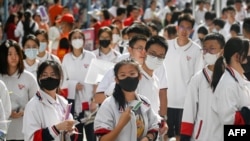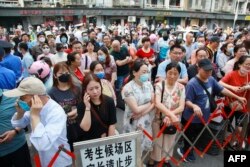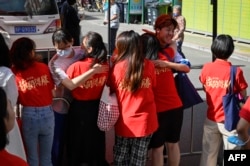Millions of Chinese students sat for notoriously tough college entrance exams on Wednesday, the first since the country lifted zero-Covid rules that forced classes online for months on end.
China's education ministry says nearly 13 million students, a record, are registered this year to take the "gaokao" exams -- billed by state media as the "world's toughest."
In Beijing, anxious parents gathered around exam halls as their children knuckled down, many wearing red for good luck.
Zhang Jing, a mother in her forties, compared herself to Bai Suzhen, a character in Chinese folklore who is locked in a tower until her son passes an important test.
My son is quite relaxed, I think I am more nervous than him," Zhang, wearing a red qipao, a traditional Chinese dress, told AFP.
"I have been accompanying my son and instructing his study from the first grade of elementary school to the first year of high school," she said.
"As long as he's at home studying, I'm there by his side."
In Shanghai, mother-of-two Chen Fang told AFP she had taken the day off work.
"I thought, it's a big day for my child, so I should be part of it as a parent."
'I struggled'
Testing high school students on their Chinese, English, mathematics and other science or humanities subjects of their choice, the exams are critical to landing coveted spots at China's top universities.
Exams can last up to four days, and take between an hour and 150 minutes per subject.
In the Chinese capital, parents and volunteers held up signs saying "Go for it, youngsters!" as students posed for photos with banners assuring them that "victory is secured."
"Of course I hope that he can get a good score, but I don't want to put any pressure on him. I want him to be relaxed," mother Fang Hong told AFP.
The exams are notorious for testing the ability to compose essays in response to oblique prompts.
One sample question published on Wednesday by the People's Daily newspaper asked readers to consider two aphorisms by President Xi Jinping, adding that they would be marked in part on whether they write from the "correct angle."
"I've been waking up at 4 am every day, except on Sundays, to study for the past four years," Jesse Rao, a 17-year-old high school senior in Shenzhen, told AFP.
Adding to the stress, this year's exam-takers have spent the bulk of their high school years under pandemic restrictions, which ended abruptly in December.
"I struggled to follow online lessons last year," Katherina Wang, a high school student from Shanghai who has been through two snap lockdowns in the past two years, told AFP.
Changing notions?
The high stakes can inspire elaborate cheating attempts.
Several provinces this year have installed facial-recognition scanners to ensure proxies cannot take a test on a candidate's behalf, the state-run Global Times reported.
But some parents AFP spoke to suggested attitudes might be shifting.
"Now parents are saying that in their opinion these exams are becoming slightly less important," a Shanghai father surnamed Jiang told AFP as he waited for his daughter.
"We don't want to put too much pressure on our children, the notion that this exam decides your entire life is changing."
"I said to relax, because no matter what the end result is, they're still my child. I just want them to be healthy and happy," said a 41-year-old mother surnamed Zhang waiting nearby.
But she said she thought the gaokao was still very important.
"You can still be successful even if you don't take the gaokao, but with it, maybe the chances for success are higher."
For those who fall short, there is always next year.
In 2021, 17 percent of students nationwide retook the gaokao.
"If I don't get the results I want, I will try again," Benjamin Zhu, a high school senior from Guangzhou, told AFP.






